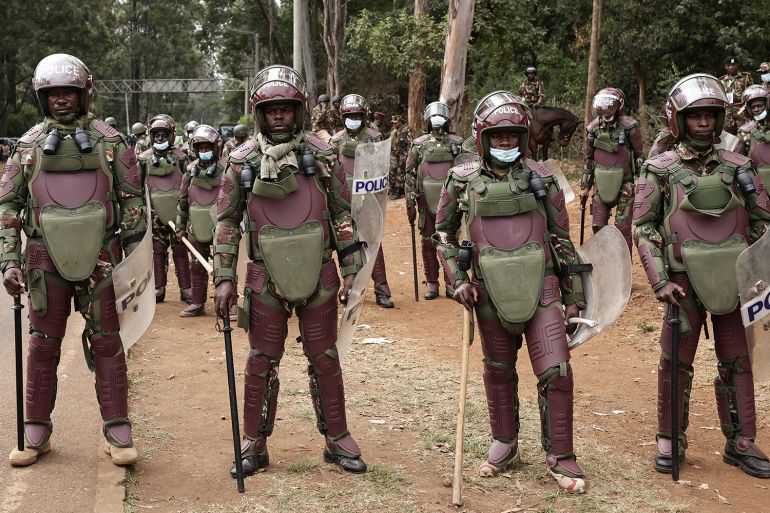Why Kenya volunteered to lead UN-approved forces to Haiti
UN Security Council approves troop deployment to Haiti, months after Kenya proposed sending 1,000 officers to the country.

The United Nations Security Council on Monday approved the deployment of international forces led by Kenya to curb escalating gang violence in Haiti.
The Caribbean country of more than 11 million people, which had requested international assistance more than a year ago to curb the rising insecurity in the country, welcomed the decision.
Keep reading
list of 3 itemsUS says Haiti security mission could deploy ‘in months’, urges support
US and Kenya sign defence deal ahead of possible Haiti mission
“The Haitian people say thank you very much to the Security Council and the Secretary-General of the United Nations,” Haitian Prime Minister Ariel Henry said on X, formerly Twitter, shortly after the UN vote.
Henry also thanked the East African country for taking the lead in proposing to send troops to Haiti.
The resolution authorises the Multinational Security Support (MSS) mission “to take all necessary measures” to stem the violence.
The international forces are not deploying under the UN peace mission. They will be overseen by Kenyan forces, which received authorisation from the UN. The 2007 African Union intervention in Somalia to combat armed groups was also authorised by the UN.
Why are foreign forces needed?
Haiti has recorded 3,000 homicides and more than 1,500 kidnappings for ransom between January and September this year, according to the UN. Gang-related violence has spiked since the assassination of President Jovenel Moise two years ago.
The violence has forced some 200,000 people, half of them children, out of their homes, according to the UN, adding that the unprecedented level of insecurity has forced tens of thousands of children to not attend schools.
Haiti, the poorest country in the Western Hemisphere where half the population lives below the poverty line, has a small and ill-equipped military. Its police force, which has about 10,000 active personnel, has also been unable to contain the violence.
The international forces will guard important public installations such as airports, ports and hospitals, among other places. They will be coordinating with the local police in carrying out anti-crime operations.
The Dominican Republic has shut its border with Haiti while several other neighbouring countries have tightened their border security following the uptick in violence in Port-au-Prince.
Why is Kenya leading the mission?
Kenya has a history of sending peacekeepers to volatile countries and offered to send 1,000 personnel to Haiti in July. Nairobi says it wants to take part in the “rebuilding” of the country, which has been run by unelected officials for years.
“This mandate is not only about peace and security, but also about the rebuilding of Haiti – its politics, its economic development and social stability,” Kenya’s Foreign Affairs Minister Alfred Mutua said in a post on his X account following the UN approval.
Analysts say apart from helping stabilise Haiti, Kenya stands to gain from sending its forces to Port-au-Prince.
“On the global stage, sending its forces to Haiti gives Kenya a very serious political capital. In the eyes of the world, Kenya becomes a dependable ally who is willing to help other countries,” Dismas Mokua, a Nairobi-based analyst, told Al Jazeera.
“The mission creates several opportunities for Kenya. Kenyan law enforcement agencies will get specialised training and equipment before they are sent. This will improve the capacity of the force in the long term. Obviously, there are financial incentives. Resources are allocated to participating countries. Troops will also be given extra allowance, which is why there is high interest from officers for foreign deployments,” he added.
On Monday, the White House expressed its “gratitude” to Kenya for assuming leadership of the force.
The non-UN mission will be funded by voluntary contributions, with the United States, while not sending boots on the ground, pledging up to $200m. It is not clear when the force will be deployed. Last month, US Secretary of State Antony Blinken said a Kenya-led mission to Haiti could deploy “in months”. The international forces have a mandate for a year.
What other countries are sending troops?
In addition to Kenya, Jamaica, the Bahamas, and Antigua and Barbuda have pledged to send personnel to the violence-racked country. Haiti is led by the unelected government of Prime Minister Ariel Henry and most countries are reluctant to be seen as propping up a regime that has not been endorsed by the people.
Human rights advocates have raised concerns against the deployment of international forces saying it would legitimise the unelected leaders in the Caribbean country.
Past missions in Haiti
Past missions to the country have been hit by scandals, which led to Haitians taking to the streets and demanding their withdrawal.
The UN’s 2004-2017 MINUSTAH mission was blighted by sexual abuse and a cholera outbreak scandal, which resulted in the death of more than 9,000 people with 800,000 others sickened. UN soldiers were also accused of fathering babies and abandoning them.
Haiti was free of cholera until 2010, when UN peacekeepers dumped infected sewage into a river. The MSS will be the first time the UN has approved a force to deploy to Haiti since MINUSTAH, which was deployed under its Department of Peacekeeping Operations.
The MSS resolution calls for members of the force to be vetted and rapid investigations into misconduct allegations, particularly sexual abuse of women and girls. It also calls for careful wastewater management to prevent disease outbreaks.